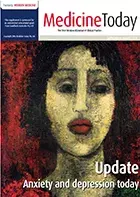Foreword: Treating anxiety and depression in Australia: reasons for optimism
PHILIP B MITCHELLManaging anxiety disorders in children and adolescents
SLOANE MADDENAnxiety disorders affect almost one in 10 children and adolescents and may cause significant impairment and distress. Fortunately these disorders respond well to cognitive behavioural and family therapies and to medications.
Assessing and treating mixed depression and anxiety
PHILIP B MITCHELL, JILLIAN BALLHow can clinicians make sense of patients experiencing both depression and anxiety, and decide on treatment? This article reviews the overlap between depression and the different anxiety disorders and details the various pharmacological and psychological therapeutic options.
Assessing and managing social anxiety disorder
JEANNETTE MILGROM, GRAHAM D BURROWSSocial anxiety disorder is common and symptoms range from excessive shyness to overwhelming and disabling panic. Cognitive behavioural therapy is an effective psychological treatment and antidepressants are the usual first line pharmacological treatment.
Generalised anxiety disorder: focus on adults
JOHN W G TILLERAlthough generalised anxiety disorder is the archetypal anxiety disorder, affects almost 6% of the population and is amenable to treatment, it has not received the attention given to other anxiety disorders.
Diagnosing and managing depression in adults
PHILIP BOYCE, FRANCES WILSONDepression accounts for a large number of presentations in general practice. Successful management depends on recognising clinical depression when patients present with it and treating appropriately, as determined by the type and severity of the depression.
Depression in women: aetiological factors and treatment implications
DAVID J CASTLE, CHEE H NGDepression is more common in women than men for both biological and psychosocial reasons. Treatment interventions for depressed women need to take into account their particular life phase.
On the (examination) couch: psychotherapy for depression in general practice
RALF ILCHEFResearch suggests that short term psychotherapies work as effectively as antidepressants in mild to moderate depression and can be delivered effectively in primary care settings. This article summarises psychotherapies that are available in general practice and makes some clinically informed suggestions for matching treatments to individual patients.
Meeting the challenge of suicide prevention
ROBERT D GOLDNEYThere was a reduction of about 20% in the number of suicides in Australia between 1997 and 2003, probably due to better recognition and treatment of mental disorders by GPs. Continuing vigilance in the detection and management of mental disorders should reduce the number of suicides further.
Reuptake inhibitors for depression
BILL LYNDONThe newer, more selective, neurotransmitter reuptake inhibitors have significant advantages in safety and side effects compared with the original reuptake inhibitors, the tricyclics.

